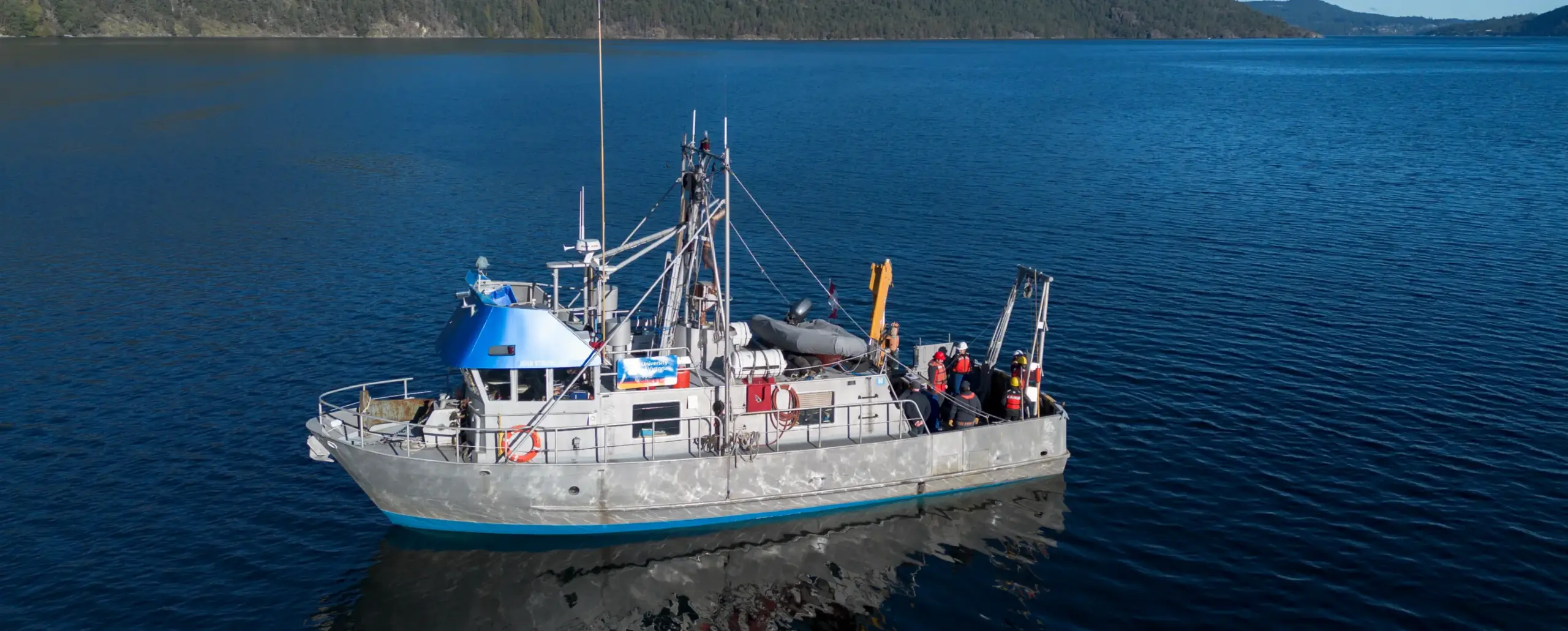Education
Celebrating 50 Years of Research and Education on the RV John Strickland

The RV John Strickland, a pivotal research vessel for the University of Victoria (UVic), is marking its 50th anniversary on November 4, 2023. This vessel has played a crucial role in the university’s biology and earth and ocean sciences departments, facilitating extensive marine science research and education since its inception.
Origins of the Strickland
The story of the Strickland began with a vision from UVic faculty members, particularly Jack Littlepage. They sought a vessel designed specifically for the intricate coastal waters of British Columbia, aimed at serving both research and educational purposes. After years of advocacy, the UVic Board of Governors approved the project on October 15, 1973.
Renowned naval architect David Moore was brought on board to design the vessel. Construction contracts were awarded to Shore Boat Builders in Vancouver, BC, with further work completed by Philbrook’s Shipyard in Sidney, BC. Despite challenges, including a budget overrun of $100,000 and a delay of nearly six months, the Strickland was delivered to UVic in November 1975.
Derek Ellis, a biology professor, emphasized Littlepage’s integral role in the Strickland’s creation, stating in a letter from August 17, 1976, that “Jack [Littlepage]’s conviction and persistence” were essential to the project’s success.
Leadership and Impact
Throughout its history, the Strickland has had only a few captains. Don Horn served as the first and only permanent captain until 1999, when management shifted to a local contractor due to lower demand. Ken Brown took over and led the vessel until his retirement at the end of 2024. Currently, Casey Brant is the captain, making her the first woman and first Indigenous person to hold this position.
The Strickland has become a cornerstone of experiential learning at UVic, offering marine biology and ocean science students hands-on opportunities. From its first operational year in 1976, when it traveled to Bamfield for a Marine Pollution course, the vessel has enabled students to engage directly with the marine environment. Today, students routinely participate in research cruises, gaining practical experience with equipment such as CTD (conductivity, temperature, and depth) sensors and Niskin bottles.
Antonia Kropp, a third-year chemistry and ocean sciences student, expressed the importance of this experience, stating, “Spending the day on UVic’s research vessel allowed me to apply classroom knowledge in a practical setting.”
Research Contributions and Collaborations
The RV John Strickland has been extensively utilized for research in Saanich Inlet, a unique marine environment known for its low oxygen levels. UVic researchers, including biological oceanographer Diana Varela, have conducted studies on phytoplankton productivity in this area. Their work is essential for understanding how climate change is affecting coastal marine systems.
The Strickland has also served external organizations. It was expected to generate income through charters from various entities, including the Institute for Ocean Sciences and the Geological Survey of Canada. In 1980, with funding from the Natural Sciences and Engineering Research Council (NSERC), the vessel expanded its operations to assist other west coast universities until funding ceased in 1987.
In recent years, the Capital Regional District has employed the Strickland for water quality monitoring and sediment sampling, further solidifying its role as a resource for environmental science.
Notable Research and Rescue Missions
The vessel has been involved in significant research projects, including studies on sea otter transplants and the effects of environmental changes on marine life. Notably, the Strickland was instrumental in the research conducted by UVic biologist John Hayward, who studied cold-water immersion physiology. His findings contributed to hypothermia treatment guidelines in Alaska and led to the development of the Thermofloat jacket, designed to delay hypothermia onset.
The Strickland is not only a research vessel but also has a history of life-saving missions. In August 1982, it rescued three brothers stranded on a reef in Barkley Sound after their canoe capsized. The crew provided them with warm clothing, food, and transportation back to safety, showcasing the vessel’s versatility beyond research.
As the RV John Strickland approaches its 50th anniversary, it stands as a testament to the impact of dedicated research and education on marine science. With a legacy of enhancing student experiences and contributing to critical scientific knowledge, the Strickland is poised to continue its mission for another 50 years, enriching the understanding of our oceans and the diverse life within them.
-

 Science3 months ago
Science3 months agoToyoake City Proposes Daily Two-Hour Smartphone Use Limit
-

 Top Stories3 months ago
Top Stories3 months agoPedestrian Fatally Injured in Esquimalt Collision on August 14
-

 Health3 months ago
Health3 months agoB.C. Review Reveals Urgent Need for Rare-Disease Drug Reforms
-

 Technology3 months ago
Technology3 months agoDark Adventure Game “Bye Sweet Carole” Set for October Release
-

 World3 months ago
World3 months agoJimmy Lai’s Defense Challenges Charges Under National Security Law
-

 Lifestyle3 months ago
Lifestyle3 months agoVictoria’s Pop-Up Shop Shines Light on B.C.’s Wolf Cull
-

 Technology3 months ago
Technology3 months agoKonami Revives Iconic Metal Gear Solid Delta Ahead of Release
-

 Technology3 months ago
Technology3 months agoApple Expands Self-Service Repair Program to Canada
-

 Technology3 months ago
Technology3 months agoSnapmaker U1 Color 3D Printer Redefines Speed and Sustainability
-

 Technology3 months ago
Technology3 months agoAION Folding Knife: Redefining EDC Design with Premium Materials
-

 Business3 months ago
Business3 months agoGordon Murray Automotive Unveils S1 LM and Le Mans GTR at Monterey
-

 Technology3 months ago
Technology3 months agoSolve Today’s Wordle Challenge: Hints and Answer for August 19









